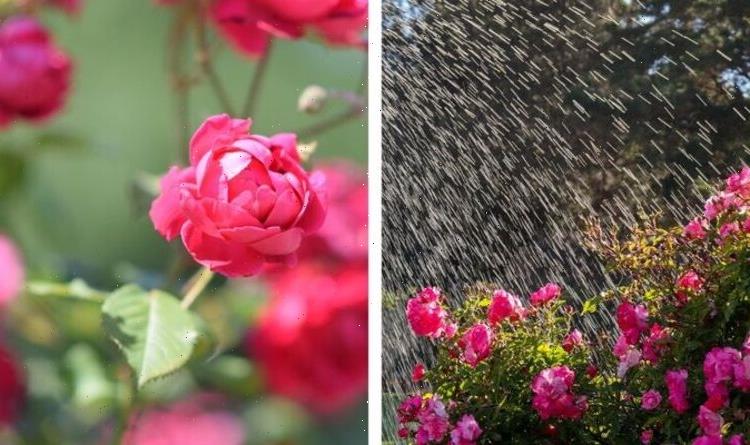
How to water your roses – 4 top tips to help your roses thrive
03/16/2022Gardening expert demonstrates how to get rid of weeds
We use your sign-up to provide content in ways you’ve consented to and to improve our understanding of you. This may include adverts from us and 3rd parties based on our understanding. You can unsubscribe at any time. More info
Roses are particularly hungry plants so tend to need a little more attention throughout their lifespan to guarantee optimum blooms and growth. The need for watering varies greatly throughout the year and it’s important to gauge seasonal rainfall, but once you get the hang of it, caring for your roses will become second nature.
As fairly robust plants, roses can pretty much be planted anywhere at any time – as long as the earth is not frozen, waterlogged, and it’s not during a drought.
For the best results, however, it is recommended they be planted in a spot that receives a good level of sunlight, at least three feet away from other plants to avoid competition, and out of the way of exposed, windy sites.
Roses also tend to perform much better when they’re watered frequently, but how much is too much?
Here are four top tips to help you water your roses for the best results.


Stay close to the base
Water your roses as close to the base as possible. If the water starts to flow away from the base, wait until the water soaks to continue again.
It’s very difficult to overwater roses – but it can happen. It’s important not to let the roots rest in cold water for long periods of time.
David Austin Roses recommends using a watering can to help you monitor how much water you’re using. If you have a lot of roses, use a hose with a rose attachment to save time.
Avoid watering over the flowers
By sticking closer to the base, you can avoid watering over the flowers or foliage.
Watering over the flowers can increase the risk of disease – more so if it remains coated on the leaves for extended periods of time.

Use a softer spraying mechanism
A softer spray will be much kinder to your roses, as opposed to a harsh deluge from a pressure hose.
Try to get a specialised rose fitting to attach to your hose. If this isn’t possible, just ensure the water pressure isn’t too high.
Water your roses regularly
Rose specialists at Peter Beales said: “Roses grown in pots should be given a good water daily, throughout the growing season.”
Particularly during the summer season, “newly planted roses should be watered regularly until their roots are established.
DON’T MISS:
Flowers: The 95p hack to keep any cut blooms thriving for longer [INSIGHT]
How to control houseplant pests with ‘all natural home remedies’ [EXPLAINED]
Gardening: Expert shares best tasks to do in the garden now [ANALYSIS]

Sufficient watering will prevent the development of rose diseases.
David Austin Roses have provided a rough guide of how much water your roses will need, as follows:
Shrub roses – five litres
Climbing roses – 10 litres
Rambling roses – 10 litres
Standard tree roses – 10 litres
Roses in pots – five litres
Other roses that require extra attention aside from the ones newly planted, or the ones in pots, include climbing roses against walls (due to the dryer nature of the soil), and roses planted in sandy soil.
So make sure you monitor these roses more closely, showering them with a little more water than usual.
David Austin Roses has also provided a seasonal watering guide.
Between October and February, your roses are unlikely to need watering from you – the UK gets enough rain.
During March to May, David Austin Roses recommends: “Watch out for particularly prolonged dry spells of two weeks or more, particularly if the weather is warm.
“Newly planted roses should be watered every two or three days. Established roses should be watered once a week.”
Over the course of June to September, slightly more care is required.
Established roses are recommended to be watered once a week, and newly planted roses should be watered every other day.
David Austin Roses said: “As your rose starts blooming, take note if your flowers are wilting. This will happen in extreme heat but is a reliable sign that your roses need more water.”
Source: Read Full Article

